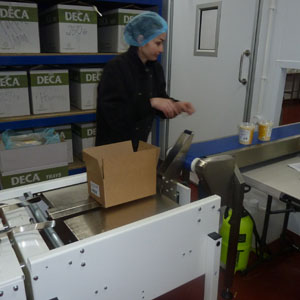Navigating the Automation Landscape for SMEs
With their agility and ability to swiftly evolve, SMEs are often a breeding ground for groundbreaking ideas and innovation which is helping to shape the landscape within the industries they operate within. SMEs make up a staggering 99.9% of the UK’s private sector with a total turnover estimated at £2.4 trillion.
Yet, for all their prominence, SMEs face an ongoing challenge within the current climate – the struggle to remain competitive with fewer resources at their disposal than their larger counterparts.
A critical facilitator in driving competitiveness lies in automation. Adopting automation can be a powerful tool to increase efficiency, drive down costs, and pave the way for strategic growth.
While high-spec systems might seem inaccessible to SMEs, in reality, it is precisely these businesses that stand to gain the most from automated systems. They possess the dynamism to rapidly adopt change and the drive to optimise performance, which are foundational pillars for the successful deployment of automation.
For SMEs that have yet to take the plunge, the time is ripe. The UK’s commitment to supporting small to medium-sized businesses has been underscored by the Government-backed programme ‘Made Smarter’. Last year it was announced that this programme, which helps SMEs access technology and digital skills, would be expanded to all nine English regions in 2025-26 before being rolled out across Scotland, Wales, and Northern Ireland from 2026-27. As a result, hundreds of thousands of SME manufacturers will get access to technology advice, leadership, and skills training, as well as grant funding for technology projects.
Here, Endoline Automation explores how SMEs can strategically and practically approach automation, demystifying the process and transforming what might seem like a daunting leap into an achievable stride forward.
The importance of flexibility in a dynamic world
SMEs are no strangers to change. They often find themselves adapting their business models and strategies to meet the changing demands of the market. In this climate, adaptability is paramount.
Automation systems should not merely cater to an SME’s current needs but also have the ability to accommodate future growth. For instance, investing in automation that can be easily reconfigured and re-engineered with new technologies ensures that the system will grow in tandem with the business.
Legacy systems have traditionally been perceived as inflexible, but this is not always the case. Today, many of Endoline Automation’s systems have been in place for decades, retrofitted with the latest technology and updated over the years to ensure that they remain useful and efficient. The portability of systems is equally crucial. SMEs might upgrade or relocate their facilities, and their automation equipment should be able to move with them, minimising disruption, and additional costs.
Calculating the investment
Every financial decision made by an SME must be tailored to ensure a swift and sound return. Investment in automation is no exception. While the up-front costs may seem high, the long-term gains from investing in quality, well-built systems will justify the expenditure.
The key here is not to fall for bells and whistles that inflate costs without adding significant value. SMEs need to seek out solutions that offer a pragmatic blend of functionality, efficiency, and longevity. End-of-line equipment does not need to be extravagant; it just has to be well-suited to a business’s unique needs.
Streamlining Integration and Operation
Ease of use can be the make-or-break factor for an SME venturing into automation. Smooth and intuitive operations are not merely a convenience; they are vital to prevent any disruptions that could erode the production line’s efficiency and, ultimately, the bottom line.
Partnering with suppliers who understand the specificity of SME operations is invaluable. They should offer comprehensive training and on-site support to ensure factory floor staff can operate and maintain the automated system with confidence.
Gradual Automation Commitment
The adage “Don’t run before you can walk” has particular resonance in the context of SME automation. It is not a race, but a marathon. A strategic, phased approach—starting small and scaling up—allows the business to acclimate to automation while still benefiting from key efficiency enhancements.
Begin with automating key, repetitive tasks that yield high returns. This could be as simple as automating the case erecting and sealing process while retaining a level of manual labour that augments the automated systems and supports the transition. Automation can also support the upskilling of staff.
The Importance of Partnerships
Sourcing automation equipment from reputable suppliers is akin to laying a solid foundation.
With an established supplier, the SME inherits the supplier’s legacy of quality and support, gaining access to a network of specialists, service engineers, and spare parts readily available when needed.
SMEs, more than any other business category, must value the stability that comes with reliable partnerships. Endoline Automation has spent decades serving SMEs, and their technological innovations have been proven in the field, providing tangible benefits to a range of businesses.
Case Studies in Success
Demonstrating the effectiveness of automation for SMEs, Endoline Automation has worked with many SMEs over the years, including Marshfield Farm and Ramona’s Kitchen. These firms, in their distinct industries, have experienced significant increases in efficiency, output, and overall performance by adopting automation.
Supporting the growth of Marshfield Farm, a family-run ice-cream producer, Endoline upgraded an existing case erecting system to manage an increase in demand, reduce labour costs and reduce packaging waste.
Ramonas Kitchen, a supplier of high-quality Mediterranean-inspired foods, increased output by 100% after installing automated case-erecting and sealing systems to meet the challenge of exponential growth while maintaining exceptional quality and service standards.
The UK’s commitment to supporting manufacturing through programs such as Made Smarter stands as a beacon, illuminating the path for SMEs. With this strategic guide in hand, SMEs can approach automation with confidence, focusing on adaptability, efficiency, and growth.
End

